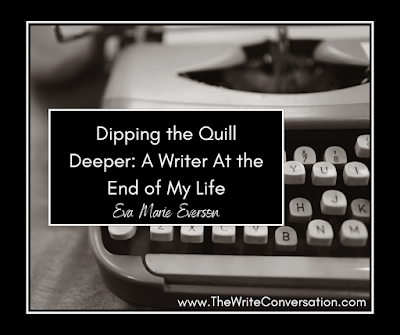Edie Melson's Blog, page 100
January 28, 2023
2 Reasons Voice is Important to Writers

by Edie Melson @EdieMelson
When he has brought out all his own, he goes on ahead of them, and his sheep follow him because they know his voice. But they will never follow a stranger; in fact, they will run away from him because they do not recognize a stranger's voice." John 10:4-5 (NIV)
Throughout my years of teaching—whether at a Christian Writers Conference or a Bible study—probably the question I’ve been asked the most has been, “How do I know it’s really God speaking to me?” The answer is at once very simple and very hard. You can tell it’s God’s voice, because you recognize it.
I’ve come to realize that voice is vitally important to a writer in two ways:We have to come to embrace and utilize the uniqueness of our own personal voice when we write. This is a topic of craft.We also have to come to recognize God’s voice so that we can share what He has for us to share. This is a topic of the heart.
So how do we recognize God’s voice? How do we recognize anyone’s voice—by becoming familiar with the timber, pitch and way of speaking. I’m sure we’ve all had the experience of answering the phone and having someone begin the conversation without identifying themselves. Sometimes I can spend several moments wondering who they were. I’ve found this doesn’t often happen when the person on the other end is a close friend.
To recognize God’s voice we have to spend time with Him—quality time—in prayer, worship and study. With that commitment of time comes the reward of a deep relationship and the assurance of knowing whose voice we hear. This doesn’t mean there aren’t still times when I question whether or not it’s God speaking, but I can say with certainty that those times become less and less, the closer I get to God.
What are some ways you’ve found to recognize God’s voice? I’d love to hear your stories.
Don't forget to join the conversation!Blessings,Edie
TWEETABLE2 Reasons Voice is Important to Writers, @EdieMelson (Click to Tweet)
 Edie Melson is a woman of faith with ink-stained fingers observing life through the lens of her camera. No matter whether she’s talking to writers, entrepreneurs, or readers, her first advice is always “Find your voice, live your story.” As an author, blogger, and speaker she’s encouraged and challenged audiences across the country and around the world. Her numerous books reflect her passion to help others develop the strength of their God-given gifts and apply them to their lives. Connect with her on her website, through Facebook, Twitter and Instagram.
Edie Melson is a woman of faith with ink-stained fingers observing life through the lens of her camera. No matter whether she’s talking to writers, entrepreneurs, or readers, her first advice is always “Find your voice, live your story.” As an author, blogger, and speaker she’s encouraged and challenged audiences across the country and around the world. Her numerous books reflect her passion to help others develop the strength of their God-given gifts and apply them to their lives. Connect with her on her website, through Facebook, Twitter and Instagram.
Published on January 28, 2023 22:00
January 27, 2023
Five Myths & Five Facts About Screenwriting that Every Writer Should Know

by Zena Dell Lowe @ZenaDellLowe
I’m regularly approached by novelists who want to learn how to write screenplays because they’re interested in seeing their own projects made into films. There’s nothing wrong with this. In fact, Hollywood loves pre-published material. However, adapting a novel into this medium may not be as easy as you think.
The number one reason why scripts get rejected in Hollywood is because of formatting errors. Mistakes in formatting automatically signal to the powers-that-be that you’re an amateur. It tells them that you don’t know what you’re doing. Hollywood is a high-stakes, high-risk industry. If you haven’t mastered the craft, your script just got a pass.
The second most common reason why scripts get rejected is that they’re poorly written. Very few trained screenwriters have learned how to properly marry the technical aspects of screenwriting with the artistry the medium. It can take YEARS to learn how to do this well. As a result, even scripts that are formatted correctly rarely attain to the level of excellence that the industry demands.
If you’re a screenwriter (or want to be), here are 5 MYTHS & 5 FACTS about screenwriting that every aspiring screenwriter should know.
MYTHS About Screenwriting Every Writer Needs to Know
1. Myth #1: I already know how to do this.
I’m amazed how often people submit scripts for me to critique, and when I ask if they want feedback on formatting, they say, “No. I know how to format.” Then I’ll get their script and find 12 errors on the first page. It seems like they should know better, but they don’t. The truth is, you don’t know what you don’t know.
2. Myth #2: My screenwriting software does this for me.
Screenwriting software helps, but you still have to know what you’re doing. You can beat the software and end up with some egregious mistakes. Moreover, software programs such as Final Draft are more geared to the production process than the writing one. There are many tools and options that screenwriters are not meant to select. And yet, I regularly see writers who turn in scripts with these functions enabled.
3. Myth #3: The Story is all that matters.
In screenwriting, the formatting IS the story. You can’t separate the story from the medium itself. It’s all one and the same thing.
4. Myth #4: Someone else can format it for me later.
But again, the writing is the formatting. Imagine wanting to write a poem and picking out all the words you want to use, but then handing them off to someone else to put in the right order. You couldn’t claim to be the writer because it wouldn’t be your poem. Whoever puts the words in the form of a poem is the actual writer, and the same is true with a screenplay.
5. Myth #5: Screenplays are boring, technical documents.
Wrong. A screenplay is as close to poetry as any other medium. It’s all about powerful word choices and economy of language. As such, screenplays should be every bit as exciting to read as your favorite novel. Unfortunately, they seldom are.
If you’re interested in launching a successful screenwriting career, here are some facts you should know.
FACTS About Screenwriting Every Writer Needs to Know
1. FACT #1: Screenplays are the blueprints for the production process.
Put simply, making a movie is a team effort. It’s the most collaborative artistic medium on the planet. The screenwriter creates the document upon which everything else is built. Without this document, nothing happens. There’s nothing to create. The script impacts the entire production process, because every word is there to aid the other departments. You’re giving them the essential information they need in order to do their jobs well. If you fail to give them the right information in the right way, the set will be in chaos. Learning the rules and why they exist is an essential skill for a screenwriter because it enables you to write like a member of the film production team—this knowledge alone can take you to the next level.
2. FACT #2: Screenplays are all about timing.
1 page of a properly formatted script equals roughly 1 minute of screen time. You’re controlling the pacing—what we’re looking at and for how long. Clunky writing slows down the story. It makes it drag; it arrests momentum. You need to know which elements to include and in how much detail, so that your stories move at a reasonable pace.
3. FACT #3: The ideal length of a screenplays is between 100 to 120 pages.
It’s all about box office. To maximize profit, a movie theatre aims to have 5 showings per day on each screen. If your film is 3 hours long, they can only show it 3 times per day, and since ticket prices don’t change depending on the length of the film, this eats into the profits. Executives are nervous enough about making a return on their investment. A longer movie means it’s going to take longer to make back their money, if they make it back at all.
4. FACT #4: It’s not enough to know the rules.
You must understand WHY the rules exist, so that you’ll know when and how to employ them for maximum impact. It’s about convey meaning on a much deeper level. This IS the artform—to develop the ability to tell a story in a visual way that impacts the audience on a deep, emotional level. The more we know, the better we’ll be at milking the medium for all it’s worth.
5. FACT #5: The basic building block of a screenplay is the scene.
You start with one scene, and then the next, and then the next, and so on until you’ve got a completed screenplay. However, each of those scenes is a world unto itself. A screenplay is only as good as the sum of its component parts. Until you learn how to maximize the artistic potential of each individual scene, you are unlikely to complete a tight, unified whole.
You can predictably build a career as a screenwriter and see the doors of opportunity open for you simply by acquiring the right skills and knowledge to turn you into a master craftsman. If this is your desire, check out our available classes for screenwriters on The Storyteller’s Mission website. To learn more about what you can do to master this craft, go to: https://www.thestorytellersmission.com/formatting-as-an-artform
TWEETABLEFive Myths & Five Facts About Screenwriting that Every Writer Should Know, tips from Screenwriter & Storyteller @ZenaDellLowe on @EdieMelson (Click to Tweet)
 Zena has worked professionally in the entertainment industry for over 20 years as a writer, producer, director, actress, and story consultant. Zena also teaches advanced classes on writing all over the country. As a writer, Zena has won numerous awards for her work. She also has several feature film projects in development through her independent production company, Mission Ranch Films. In addition to her work as a filmmaker, Zena launched The Storyteller’s Mission with Zena Dell Lowe, a podcast designed to serve the whole artist, not just focus on craft. In 2021, Zena launched The Storyteller’s Mission Online Platform, where she offers advanced classes and other key services to writers. Zena loves story and loves to support storytellers. Her passion is to equip artists of all levels to achieve excellence at their craft, so that they will truly have everything they need to change the world for the better through story.
Zena has worked professionally in the entertainment industry for over 20 years as a writer, producer, director, actress, and story consultant. Zena also teaches advanced classes on writing all over the country. As a writer, Zena has won numerous awards for her work. She also has several feature film projects in development through her independent production company, Mission Ranch Films. In addition to her work as a filmmaker, Zena launched The Storyteller’s Mission with Zena Dell Lowe, a podcast designed to serve the whole artist, not just focus on craft. In 2021, Zena launched The Storyteller’s Mission Online Platform, where she offers advanced classes and other key services to writers. Zena loves story and loves to support storytellers. Her passion is to equip artists of all levels to achieve excellence at their craft, so that they will truly have everything they need to change the world for the better through story.To find out more about Zena or her current courses and projects, check out her websites at WWW.MISSIONRANCHFILMS.COM and WWW.THESTORYTELLERSMISSION.COM
Published on January 27, 2023 22:00
January 26, 2023
5 Ways to Use Your Calendar to Organize Your Writing Life

by Lori Hatcher @LoriHatcher2
We’re almost a month into 2023. Do you have a plan to stay on track, submit your work on time, and organize your writing life? If not, here are five tips that have helped me.
5 Tips to Use the Calendar to Stay on Track with Your Writing
1. Use a Paper Calendar
I love technology (when it works), but, for me, a good, old-fashioned paper calendar serves me better than digital records and reminders. I love being able to see every submission that’s due each month and when it will run. While I may back up my paper calendar with electronic reminders, paper trumps technology every time.
2. Note three dates for every assignment.
Each January, I pencil in every writing commitment I have. For monthly commitments like this column submission, I note the date the piece is due and then go back a week. This date becomes my submission goal.
Why submit a week (or more) early? Editors love working with writers who submit before the deadline. We make their job easier, and they’re more likely to consider us for additional work, because they know we’ll deliver. An early submission date also gives me a time cushion in case something unexpected, like an illness or family emergency, comes along.
I also note the date the article will run. This reminds me to like and share the post on social media.
3. Write down every speaking opportunity.
You don’t have to have a formal speaking ministry to make these notes on your calendar. Did you speak at a Book Club meeting? Teach Sunday School? Share a message at your child’s school PTO meeting? Did someone invite you to bring a devotion at a ladies’ lunch or men’s breakfast? Write these speaking opportunities on your calendar.
You may think you’ll remember them if an editor or publisher asks you where you’ve spoken lately, but chances are, you’ll forget one or two. When my first book with Our Daily Bread Publishing went before the Pub Board, my editor asked me for a list of speaking engagements. The modest list I supplied proved I wasn’t afraid to speak in public and helped persuade my publisher to take a chance on me.
4. Note every major life event.
Write down family members’ birthdays, graduations, family vacations, your anniversary, and the annual weekend away with the girls. Will Mom have cataract surgery next month? If you’ll be driving her to her appointments, you’d better write it down. Do you keep your grandkids every Friday? Pencil that in, too.
Recording these non-negotiables helps you see what days you have available for writing. Because I work as a dental hygienist on Wednesdays and Thursdays and sponsor Fun Fridays at Gigi’s house each week, I do the bulk of my writing on Mondays and Tuesdays. I zealously guard these two days, knowing that if I misspend them, I’ll have to stay up late or get up early to compensate. Even more serious, I might miss a writing deadline.
5. Put a big red X on Sundays.
I do my best not to write or conduct any writing-related business on Sunday. I’m not legalistic about it, but I believe God ordained a day of rest (whichever day we observe it) for our benefit.
My decision not to write on Sundays frees me to rest and refresh. I spend my day doing those things that restore my mind, body, and soul. I attend church, practice hospitality, go for a walk or play Pickleball, catch up on my Bible reading, or read a book just for fun. Sometimes, wonder of wonders, I even take a nap.
Instead of limiting my productivity, I’ve found that taking a day to rest increases it. During my day of “rest,” my mind continues to think, gather information, and mull over my WIP. I return to my work eagerly instead of burned out.
If you’re struggling with organization, productivity, or deadlines, I encourage you to grab a paper calendar and start writing. If you already use a calendar, or some other means of organization, please leave a comment below and share your secrets.
May 2023 be your best writing year ever!
TWEETABLE5 Ways to Use Your Calendar to Organize Your Writing Life, tips from author @LoriHatcher2 on @EdieMelson (Click to Tweet)
 Lori Hatcher is an author, blogger, writing instructor, women’s ministry speaker, and career dental hygienist. She writes for Our Daily Bread, Guideposts, Revive Our Hearts, and Crosswalk.com. Lori’s latest devotional, Refresh Your Hope, 60 Devotions for Trusting God with All Your Heart, released on January 3. Connect with her at www.LoriHatcher.com or on Facebook, Twitter (@lorihatcher2) or Pinterest (Hungry for God).
Lori Hatcher is an author, blogger, writing instructor, women’s ministry speaker, and career dental hygienist. She writes for Our Daily Bread, Guideposts, Revive Our Hearts, and Crosswalk.com. Lori’s latest devotional, Refresh Your Hope, 60 Devotions for Trusting God with All Your Heart, released on January 3. Connect with her at www.LoriHatcher.com or on Facebook, Twitter (@lorihatcher2) or Pinterest (Hungry for God).
Published on January 26, 2023 22:00
January 25, 2023
Encouragement When You Don’t Think You Have What It Takes as a Writer

by Henry McLaughlin @RiverBendSagas
In Mark 7:30-44, Jesus feeds 5,000 with five small loaves and two fish. In Mark 8:1-10, Jesus feeds 4,000 with seven loaves.
Prior to each miracle, Jesus asked his disciples, “How much food do you have?”
Interestingly, the twelve had no food in either miracle, but they found small amounts in the crowd. Jesus took what they found and miraculously multiplied it.
In each instance, the apostles had no idea how to feed the people. In one they said the equivalent of, “It’ll take half a year’s wages to feed this crowd.” In another, they recommended Jesus send everybody home because there wasn’t a Chick-fil-A across the street.
They saw limited resources and had no idea how they could feed so many people with so little supply. Until they gave those resources to Jesus. Then there was plenty for everyone.
Do you sometimes feel you have no more to give?
I have at times. I’ve felt physically, mentally and spiritually drained until I had no resources left. But there were still people in need.
But when we give Jesus our “bread”—our resources no matter what they are or how feeble they seem, he is able to multiply it to provide for others.
And our resources aren’t just limited to our finances. Besides money, we have time. We have skills and gifts and talents, uniquely placed in us by God. We have the means to help others even when we think we don’t. What we’re missing is to involve Jesus.
On our own, my wife and I can’t give financial wisdom and counsel to others. But when we join with Jesus, he multiplies our supply. He gives us patience to listen and discernment to understand. He gives us words of insight and encouragement. He gives us knowledge of tools and resources to share with those who are hurting. When we yield ourselves to him, he is able to do above and beyond anything we could ever think or imagine. And we’ve seen the miracles he’s brought into people’s lives.
God has gifted me as a writer. Believe me. I couldn’t write on my own. I’ve tried and disaster followed. When I yielded to his call to write, things happened. An award-winning book followed by others.
Then he extended the call to help others on their writing journeys. I balked, believing I had nothing to give. He patiently showed me gifts and talents he’d placed in me to teach, edit, mentor, and coach.
Praise him for his patience with us. He opened doors for me to share these gifts with others. I’ve grown as a person and as a writer because I gave him what I saw as limited resources—my own few small loaves and a couple of fish. And he used them to bless others. And I’ve been rewarded to see their growth and success.
It may not look to you like you have much but give it to God and let him bless it. Walk in faith and obedience to serve others and watch what he will do.
TWEETABLEEncouragement When You Don’t Think You Have What It Takes as a Writer from author Henry McLaughlin, @RiverBendSagas on @EdieMelson (Click to Tweet)
Henry’s debut novel, Journey to Riverbend, won the 2009 Operation First Novel contest.
Henry edits novels, leads critique groups, and teaches at conferences and workshops. He enjoys mentoring and coaching individual writers.
Connect with Henry on his BLOG, TWITTER and FACEBOOK.
Published on January 25, 2023 22:00
January 24, 2023
Writing Tips from Bestselling Writers

by DiAnn Mills @DiAnnMills
We all have our revered and treasured writers who never fail to bring us exciting and quality reads. Let’s look at a few bestselling writers’ favorite writing tip(s) in alphabetical order.
Janice Cantore “Learn to deal with criticism and rejection. Every writer experiences rejection at one time or another. The important thing is what they do with it. A writer who accepts helpful critiques is able to move forward and write better. Thoughtfully consider the red marks and notes from editors/reviewers. Be honest with yourself and your work. I’ve heard stories at writer’s conferences about writers who won’t accept constructive criticism. They're in love with what they put on the page, and they refuse to listen to editors or agents who give helpful critiques. A person who can’t look at his/her writing honestly and make changes is not likely to ever be published.”
Lynette Eason “Write SOMETHING. You can fix words. You can’t fix a blank page.”
James R. Hannibal “It's not a book, it's a career."
This advice from author Tom Young stuck with me over the years. He offered it to me not long after my introduction to the thriller community via ThrillerFest's debut author program. Since then, I've come across so many writers who've been "working on their novel" for years. Finish that book. Move on to the next one. Keep writing. As Tom said, being a professional author is not about that one book. It's a career filled with books.
Steven James “Discard your outline. Follow the story where it’s nudging you to go rather than trying to tell it what to do. Be responsive as it unfolds, and always let characters act in honest and believable ways.”
Edie Melson “My best tip is twofold:Don’t quit and be willing to learn while you wait!”
DiAnn Mills “Every day: read, write, edit, pray, and repeat.”
Deborah Raney “Read your book aloud, especially the dialogue sections. I’m always amazed how many mistakes I find when I read aloud. More importantly, I often change the dialogue after reading aloud because I realize I didn’t quite have the inflection right or that there’s a quicker or better way to get the idea across. If your book will become an audiobook, it’s all the more important to read your work aloud to be sure everything sounds as good in audio form as it does in written form.
My other advice is: Check the first lines of every scene to be sure you’ve given the reader a visual “stage” on which the action takes place. Even five words—'She gripped the steering wheel.’—lets the reader picture the scene as if it were a movie.”
Darlene Turner “Reach out to other authors and not be afraid to ask questions.
Read more in both fiction and writing craft books.
Don’t compare yourself to other authors—everyone’s journey is different.
Don’t be in a hurry to get published—more than one author told me this one. Be careful which contracts to accept. Research as not all publishers are equal.”
What is your favorite writing tip?
TWEETABLEWriting Tips from Bestselling Writers, compiled by @DiAnnMills on @EdieMelson (Click to Tweet)
 DiAnn Mills is a bestselling author who believes her readers should expect an adventure. She creates action-packed, suspense-filled novels to thrill readers. Her titles have appeared on the CBA and ECPA bestseller lists; won two Christy Awards; and been finalists for the RITA, Daphne Du Maurier, Inspirational Readers’ Choice, and Carol award contests.
DiAnn Mills is a bestselling author who believes her readers should expect an adventure. She creates action-packed, suspense-filled novels to thrill readers. Her titles have appeared on the CBA and ECPA bestseller lists; won two Christy Awards; and been finalists for the RITA, Daphne Du Maurier, Inspirational Readers’ Choice, and Carol award contests. She is the former director of the Blue Ridge Mountain Christian Writers Conference, Mountainside Marketing Retreat, and Mountainside Novelist Retreat with social media specialist Edie Melson. Connect here: DiAnnMills.com
Published on January 24, 2023 22:00
January 23, 2023
Dipping the Quill Deeper: A Writer At the End of My Life

by Eva Marie Everson
My husband and I decided to spend a day in Mount Dora before Christmas, to enjoy the twinkly lights, the holiday music, and the general hustle and bustle of last-minute shopping.
Mount Dora is a bedroom community about an hour north-west of Orlando, Florida known for its Southern charm, specialty shops, cozy cafes, and delectable restaurants. Everything about it screams, “Come see me!”
So we did.
The day was perfect weatherwise—not too hot, not too cold. The sunlight winked between the buildings and the thick live oaks, casting silver linings to the Spanish moss that dripped from their gnarled branches. We started the day with a cuppa, then slipped in and out of the shops, all of which sold a remarkable number of pricy candles in varying scents, and in general simply enjoyed the day.
In one shop teeming with patrons, I was shoved (not forcefully, but shoved nonetheless), toward a wall, the toe of my shoe nearly bringing down a large plank of wood with words painted in white. Lots of words.
I stepped back to read the message, which turned out to be a quote from the late Erma Bombeck, an American humorist whose written work used to send me into waves of hysterical laughter. But this line did anything but.
When I stand before God at the end of my life, I would hope that I would not have a single bit of talent left and could say, “I used everything you gave me.”
The words stayed with me the rest of the day—through lunch, as we meandered in and out of other shops, when we stopped for another cup of coffee (this time with pastries) . . . When I stand before God . . . I used everything . . .
This One Gift
In the January 2023 issue of Today’s Christian Living magazine, bestselling author, Jerry B. Jenkins, is quoted as saying, “I’m surprised that I am mono-gifted. I had hoped to be more widely talented, but one has to be realistic. I don’t mean to sound falsely modest, but knowing I have just this one gift has motivated me to exercise it all the more.”[1]
While I believe that Mr. Jenkins has more than one gift (he is one of the most giving people I’ve ever had the honor of being associated with), what he has done with the “one gift” most of us
know him for—writing—he has done well. He can clearly stand before God at the end of his life, as Mrs. Bombeck hoped to do, and say, “I used it all.”
I believe that, like Mr. Jenkins, most of us have more than one gift, but we writers . . . well, we have one very special gift. To take words, collect them, gather them onto a page (or pages), then shape them for readers of magazines, blogs, devotionals, books, take-home papers, etc. . . . this is a beautiful and precious gift from the Giver of all Good Gifts. And it’s not one that every breathing child of God holds. They may want to write and write well, but in all honesty, writing is not a gift shared by all.
The Old Testament Book of Malachi begins with God’s scolding of Israel’s priests for showing contempt for His name. They reply with a question, “When did we do that?” And God answers, “When you brought lame, diseased, and blind animals to my altar for sacrifice.” (See Malachi 1:6-8)
When we give God less than 100% of our talent—our gift—we, in our own way, show contempt for that gift.
Happy New Year
I rarely make New Year’s resolutions, but I do create mottos for the year (last year’s motto was, “If it’s not my horse, it’s not my rodeo”). This year’s is (and I’ve created a little sign just for my desk): Is it 100%? Whatever I do in my work as a writer—whatever I do with my gift from Him—I want it to be 100%. I want to stand before God at the end of my life and say, “I used it all.”
What about you?
[1] Stephanie Rische, “A Lifelong Pursuit—Jerry Jenkins Reflects on Five Decades of Writing”, Today’s Christian Living, January 2023.
TWEETABLEDipping the Quill Deeper: A Writer At the End of My Life, insight from author Eva Marie Everson on @EdieMelson (Click to Tweet)
 Eva Marie Everson is the CEO of Word Weavers International, the director of Florida Christian Writers Conference, and the contest director for Blue Ridge Mountains Christian Writers Conference. She is the multiple award-winning author of more than 40 books and countless articles and blogposts. She is also an award-winning speaker and a Bible teacher and the most recent recipient of the AWSA Lifetime Achievement Award (2022).
Eva Marie Everson is the CEO of Word Weavers International, the director of Florida Christian Writers Conference, and the contest director for Blue Ridge Mountains Christian Writers Conference. She is the multiple award-winning author of more than 40 books and countless articles and blogposts. She is also an award-winning speaker and a Bible teacher and the most recent recipient of the AWSA Lifetime Achievement Award (2022). Eva Marie is often seen at writers conferences across the States. She served as a mentor for the Jerry B. Jenkins Christian Writers Guild and taught as a guest professor at Taylor University in 2011. She and her husband make their home in Central Florida where they enjoy their grandchildren. They are owned by one persnickety cat named Vanessa.
Eva Marie's latest book, THE THIRD PATH, takes a look at 26 of the questions God asked in the Bible, then makes them personal to the reader. The premise of the book is currently her most asked for continuing workshop at writers conferences.
Published on January 23, 2023 22:00
January 22, 2023
How Writers Can Become a Valuable Critique Partner

by Ane Mulligan @AneMulligan
Remember that old TV show Truth or Consequences? If the contestant couldn't guess the truth about the guest, he had to suffer the consequences and some of those consequences were hysterical.
But what about in writing? If we submit our manuscripts without any critique or editing, what consequences do we face? Most obvious would be the manuscript would be rejected. If an author chooses to Indy publish, it's vital to sales to have your manuscript professionally edited.
I have two critique partners now who have been with me for several years. I wouldn't think of submitting my manuscript to my publisher without them first critiquing it.
My first venture into critique groups was a Christian online one. I soon gravitated to a few people whose writing I liked. They were kind in their critiques but adamant about me learning the basics of good writing. I was a raw newbie but smart enough to know I knew nothing (the best advice I got at my first writing conference was: develop rhino skin. I look at critiques as advice to make my writing better not an attack on me.
Later, several of us split off from the first group and formed our own private critique group. We made a covenant to always be honest and tough. That doesn't mean unkind—quite the opposite, really. It means speaking truth in love.
"If I could speak all the languages of the earth and angels, but didn't love others, I would only be a noisy gong or a clanging cymbal." 1 Corinthians 13:1 NLT
What does that have to do with critiques?
Let me paraphrase it: "If I could speak all the writing rules and quote the Chicago Manual of Style, but don't correct my critique partners, I would only be an unhelpful know-it-all."
When we don't offer a truthful critique—if we tell our critique partners (CPs) their work is wonderful, when in reality, it needs work, we aren't helping them. God has charged us to "As iron sharpens iron, so a CP shapens a CP." Prov 27:17, NLT paraphrased. If I don't tell my CP when something jumps out at me as wrong or uncharacteristic, I'm not helping her. I'm letting her submit something less that her best. And that is not what God expects of me.
As a Christian and a writer, I'm also called to critique as "unto the Lord," which means putting on an editor's hat and digging deep to help my CPs be her best. And I expect the same from them.
Your critique partners can become your best friends, ones you know care enough to tell you the truth.I never want a pat on the head and told, "You're a good writer." I want to be pushed and prodded to become a great writer and always do my very best…as unto the Lord.
Are YOU a critiquer of consequence? Are your critiques offered to make your CP better? Have they become so good you now have to read their chapters three times to find anything to suggest?
TWEETABLEHow Writers Can Become a Valuable Critique Partner, insight from author @AneMulligan on @EdieMelson (Click to Tweet)
 Ane Mulligan lives life from a director’s chair, both in theatre and at her desk creating novels. Entranced with story by age three, at five, she saw PETER PAN onstage and was struck with a fever from which she never recovered—stage fever. One day, her passions collided, and an award-winning, bestselling novelist immerged. She believes chocolate and coffee are two of the four major food groups and lives in Sugar Hill, GA, with her artist husband and a rascally Rottweiler. Find Ane on her website, Amazon Author page, Facebook, Instagram, Pinterest, The Write Conversation, and Blue Ridge Conference Blog.
Ane Mulligan lives life from a director’s chair, both in theatre and at her desk creating novels. Entranced with story by age three, at five, she saw PETER PAN onstage and was struck with a fever from which she never recovered—stage fever. One day, her passions collided, and an award-winning, bestselling novelist immerged. She believes chocolate and coffee are two of the four major food groups and lives in Sugar Hill, GA, with her artist husband and a rascally Rottweiler. Find Ane on her website, Amazon Author page, Facebook, Instagram, Pinterest, The Write Conversation, and Blue Ridge Conference Blog.
Published on January 22, 2023 22:00
January 21, 2023
How Writers Can Create a Great Lead Magnet Title

by Patricia Durgin @PatriciaDurgin
What Is a Lead Magnet and Why Is the Title Such a Big Deal?
Lead Magnets are the overlooked heroes of online marketing. Unassuming, they stand like sentries on your Home page and social media accounts, ready to serve at a moment’s notice.
We want ours to be so obviously helpful that readers can’t resist signing up to read it (trading their name and email to have access to it).
In their most basic format, Lead Magnets are 3-10 pages long and in PDF format. They include a great cover image, an enticing title (bonus points for an equally interesting sub-title), with images, graphics, or infographics to support the content.
They also include lots of “white space,” a designer term meaning empty space with no words or images. White space breaks up content and gives the reader a visual chance to pause and absorb your content.
Few people read page after page text with nothing to separate them—that’s like reading a clinical report—and who wants to do that?
The goal of a Lead Magnet is to answer a single question or solve a single problem the reader is dealing with now. It’s not about what you know they need; it’s offering a solution to their most pressing problem or helping them reach their most desired goal.
Titling your Lead Magnet is everything. Potential readers sign-up for it, or not, based entirely upon that single piece of information. Does your title promise it can help your readers in the specific way they want to be helped? If not, keep working on it. It’s that important.
The Process in Action
I helped a friend develop her Lead Magnet title recently. Her ministry serves Christian women dedicated to praying for their children. Here’s how our conversation went (I changed her name for privacy).
Becca: I'm working on a new Lead Magnet.
Me: Great! What's your working title?
Becca: 10 Truths About Prayer
Me: Now add a promised result...
Becca: 10 Truths About Prayer That Will Change Your Prayer Life
Me: Are your readers praying for themselves or their children?
Becca: 10 Truths About Prayer That Will Transform Your Prayers for Your Child
Me: A bit wordy. Make it tighter (reducing the number of words while keeping the primary idea
= stronger title).
Becca: Prayer Can Transform Your Child's Life
Me: Better but informational. What's the end result your readers desire for their children?
Becca: Transform Your Child's Life Through Prayer
*** YESSSS!!! ***
See how that title "plants a flag"? Do "this" and you'll get "that."
Your readers (and mine) don’t want more information. They want to experience a change.
They're looking for someone who'll stand up in the crowd and proclaim, "Do this (your message) and you'll experience that (the change they want)."
Your CONTENT may be phenomenal, but if your TITLE is not clear, action-oriented, reader-focused, with a promised result that readers want, your Lead Magnet will not help as many people as it could. What. A. Shame.
Sound marketing connects you to your audience and grows your platform, but it's not intuitive.
Fortunately, it's not a gift to be inherited (or not). It's a skill. And skills can be learned.
Hallelujah!
Shape Your Content to Fit Your Title
Becca had specific content in mind to match her former title, 10 Truths About Prayer.
As we continued chatting, I mentioned that if she’d add a number that fits her content (or if she adjusts her content to coordinate with a number), her title could be: 10 Prayers to Transform Your Child's Life.
I suggested three potential content options that would match the title above: 5 Traits to Pray “In” + 5 Traits to Pray “Out” 10 Scriptures with Promises in Those Areas and 10 Prayer Prompts with Suggested Words
She chose the first content idea above (5 Traits...) and matched it with her new, results-oriented title (10 Prayers...).
Compare her first title (10 Truths About Prayer) to this one (10 Prayers to Transform Your Child's Life). See how the last one is action-oriented, it makes a promise (IF readers apply her message), and it tells readers what info they'll receive?
There is no "magic title." Work the process. Refine. Tighten. Focus on the result your title promises. Make it clear. More readers will sign up and their lives will change when (in this case) they pray for their children, which is the goal of Becca’s ministry! BOOM!
TWEETABLEHow Writers Can Create a Great Lead Magnet Title, tips & an example from @PatriciaDurgin on @EdieMelson (Click to Tweet)
 Patricia Durgin loves clarity! It's her honor to serve Christian writers and speakers who are on fire for Jesus but who—whether beginners or advanced—lack the clarity to market their message beyond their family and friends. As a recognized marketing coach and strategist, Patricia serves via one-on-one and small group coaching, online courses, and a private Facebook group for Christian communicators. She contributes monthly columns to The Write Life, Almost an Author, and as of this article, The Write Conversation. Yay!
Patricia Durgin loves clarity! It's her honor to serve Christian writers and speakers who are on fire for Jesus but who—whether beginners or advanced—lack the clarity to market their message beyond their family and friends. As a recognized marketing coach and strategist, Patricia serves via one-on-one and small group coaching, online courses, and a private Facebook group for Christian communicators. She contributes monthly columns to The Write Life, Almost an Author, and as of this article, The Write Conversation. Yay! Though Patricia's vision impaired, Jesus sends her on grand adventures across the country, all to serve Him. Don't worry...He sends the help she needs. One day that might be you!
Connect with Patricia at MARKETERSONAMISSION.COM
Published on January 21, 2023 22:00
January 20, 2023
S.M.A.R.T. Goals for Writers in 2023

by MaryAnn Diorio, PhD, MFA @DrMaryAnnDiorio
Have you noticed how many things are labeled “smart” these days? We have SMART phones, SMART watches, and even SMART washing machines!
The word smart has become a household word in our culture. An Internet search for its definition resulted in this:
“The word ‘SMART’ refers to ‘self-monitoring, analysis, and reporting technology . . . that uses artificial intelligence, machine learning, and big data analysis to provide cognitive awareness to objects that were in the past considered inanimate.’” (Source cited: https://profoundqa.com/what-does-smar...)
So, what does smart mean when applied to goals? When we speak of smart goals, we are not referring to a system that does the monitoring, analysis, and setting of our goals for us. While we may use automated software for setting our goals, goal-setting is a task we must do ourselves.
To set S.M.A.R.T. goals is to make them S pecific, M easurable, A chievable, R ealistic, and T imely.
Let’s take a brief look at each aspect of a S.M.A.R.T. goal:
Specific: A goal is specific when it is clearly defined. In other words, there is no doubt about what the goal is.
When your goal is specific, you have a greater chance of achieving it because your goal is clear. As we do when we write our stories, we should ask ourselves the five W questions to make a goal specific.Who, besides me, is needed for me to achieve this goal?What do I want to accomplish through this goal?When do I want to accomplish this goal?Where will I achieve this goal?Why do I want to achieve this goal?
Measurable: A goal is measurable when you can measure your progress toward its accomplishment.
Unless you can measure your progress as you work toward your goal, you won’t know how far you’ve come nor how far you still have to go toward achieving it.
When establishing measuring criteria for your goal, ask yourself these questions:How much time do I need to devote toward reaching this goal? How many days? Weeks? Months? Years?How will I know if I have reached my goal?What method of measurement am I going to use to indicate my progress? A calendar? A log? A notebook? A computer software program? An app?
Achievable: A goal is achievable when it is not impossible to accomplish.
While a goal should be achievable, it should not necessarily be easy to achieve. Goals should make us stretch and become more than we were prior to achieving the goal.
To determine whether your goal is achievable, ask yourself these questions:Do I have the ability, resources, and interest to achieve this goal? If I do not, can I acquire them?Have other people before me been able to achieve this goal? While this does not have to be the case (consider Roger Bannister and the four-minute mile), it does help to know that others have achieved the same or a similar goal.
Realistic: A goal is realistic when it moves you toward fulfilling your life purpose.
When determining if a goal is realistic for you, ask yourself these questions:Is this goal within my reach?Will this goal help me or hinder me in fulfilling my life purpose?Am I willing and able at this point in my life to commit to this goal?
Timely: A goal is timely when it has a start date and a finish date.
Do not confuse a dream with a goal. A dream has no deadline date. A goal is a dream with a date on it. A goal must have time limits for achieving it. If there are no start and end dates to your goals, there will be no sense of urgency, a motivating factor essential to achieving a goal.
When setting a time limit for your goal, ask yourself these questions:When will I start working toward my goal?When do I plan to achieve my goal?
A study by the Statistic Brain Research Institute of people who make New Year resolutions revealed that only eight percent of people who set New Year goals achieve them and 92% do not. (Source cited: https://www.statisticbrain.com/new-ye...)
As we begin a new year, don’t become a victim of “New Year Syndrome.” Don’t set goals only to fail to achieve them. Use the S.M.A.R.T goal-setting method, and you will find that when 2024 approaches, you will be happy that you accomplished what you set out to accomplish at the beginning of 2023.
This coming new year, don’t work hard. Work S.M.A.R.T. Set goals using the five steps above, and you will accomplish much more than you would have otherwise.
Now, it’s your turn? Do you have a goal-setting method that works for you? If so, please share it in the comment box.
Happy Goal-Setting!
TWEETABLES.M.A.R.T. Goals for Writers in 2023, practical tips from @MaryAnnDiorio on @EdieMelson (Click to Tweet)
 MaryAnn Diorio writes women's fiction from a quaint Victorian town in southern New Jersey where the neighbors still stop to chat while walking their dogs, the houses still sport wide, wrap-around porches, and the charming downtown still finds kids licking lollipops and old married couples holding hands.
MaryAnn Diorio writes women's fiction from a quaint Victorian town in southern New Jersey where the neighbors still stop to chat while walking their dogs, the houses still sport wide, wrap-around porches, and the charming downtown still finds kids licking lollipops and old married couples holding hands.A Jersey girl at heart, MaryAnn is a big fan of Jersey diners, Jersey tomatoes, and the Jersey shore. You can learn more about her at maryanndiorio.com.
Featured Image: Photo by Sereja Ris on Unsplash
Published on January 20, 2023 22:00
January 19, 2023
A Writer’s Goals for 2023

by Crystal Bowman
As we begin another lap around the sun, we will read many posts and words of advice about setting new goals or making resolutions for the coming year. There’s something motivating about starting a new year and opening a fresh calendar with lots of blank spaces. So as writers, what can we do to fill in some of those blank spaces?
How Writers Can Move Forward This Year
Attend a writers’ conference. Whether you are a published author or not, and whether you have already attended a conference or two or three—go! Attending a writers’ conference is one of the best investments you can make in your writing career. You can meet other writers, attend workshops, listen to keynote speakers, and meet with editors and agents. Not only will you learn tons, but you will also make connections that may open doors down the road. If you can’t attend a conference in person, consider attending a virtual conference. There are benefits to both.
Try a new marketing strategy. If you have a published book that isn’t climbing in the amazon ranks, explore ways to make it more visible. Create fun Facebook memes. Offer to be a guest blogger. Go to your local bookstore and offer to do a program or book signing (for free). Be a vendor at a local event. Find local support groups or organizations that would be a good target audience and offer to give a presentation. Any exposure is better than no exposure and every little bit helps.
Try to obtain more book reviews. UGH! I hate asking for reviews but have found that most people are happy to write them. You may need to provide digital or hard copies to those who agree to write a review, but it’s worth getting your book in any format into the hands of reviewers.
Start a new writing project. Whether you are trying to get a book published or working hard to market your book(s), it can be motivating and exciting to start writing something new. It might be an article, blog post, newsletter, or manuscript—but a new writing project keeps those creative juices flowing and adds to your collection of written words.
Have your work edited. If you have written something that you would like to submit somewhere, go the extra mile, and have your work professionally edited before sending it into the world. A professionally edited manuscript will go much further than one that is not edited.
These are only a few suggestions, and you don’t have to do them all. But setting realistic, attainable goals for the coming year may increase your writing opportunities and put a smile on your face.
Writers, please join the conversation. What other goals can we add to our calendars this coming year?
TWEETABLEA Writer's Goals for 2023, insight from Crystal Bowman on @EdieMelson (Click to Tweet)
 Crystal Bowman is an award-winning, bestselling author of more than 100 books for children and four nonfiction books for women. She also writes lyrics for children’s piano music and is a monthly contributor to Clubhouse Jr. Magazine. She loves going to schools to teach kids about poetry. She also speaks at MOPS (Mothers of Preschoolers) groups and teaches workshops at writers’ conferences. When she is not writing or speaking, she enjoys going for walks, working out at the gym, and eating ice cream. She and her husband live in Michigan and have seven huggable grandkids.
Crystal Bowman is an award-winning, bestselling author of more than 100 books for children and four nonfiction books for women. She also writes lyrics for children’s piano music and is a monthly contributor to Clubhouse Jr. Magazine. She loves going to schools to teach kids about poetry. She also speaks at MOPS (Mothers of Preschoolers) groups and teaches workshops at writers’ conferences. When she is not writing or speaking, she enjoys going for walks, working out at the gym, and eating ice cream. She and her husband live in Michigan and have seven huggable grandkids. WWW.CRYSTALBOWMAN.COMWWW.FACEBOOK.COM/CRYSTAL.BOWMANWWW.FACEBOOK.COM/CRYSTALJBOWMANWWW.INSTAGRAM.COM/CRYSTALBOWMANAUTHOR
Published on January 19, 2023 22:00



